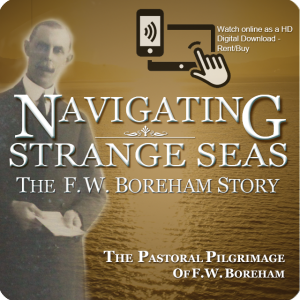V
ESCAPES—NOT HAIRBREADTH
I return to the matter of escapes, suggested by the remarkable stories of the survivors of the Titanic, and, on thinking it all over again, I have reached the deliberate conclusion that my own escape was as wonderful as any.
In The Six Gates the Rev. T. Thomson, M.A., tells this excellent story: ‘Some years ago,’ he says, ‘a steamer going from New York to Liverpool was burned at sea. A boatload of passengers succeeded in leaving the ship, and were saved. Among them was a minister belonging to Dublin. When he returned from his ill-omened voyage, he was the hero of the hour, and told his thrilling story far and near with great effect. He used to dwell especially on the signal mark of God’s favour he had received. So many had perished; yet he was saved! It was a marvellous and special providence that had so cared for him and preserved him. He never told his story without dwelling on this aspect of it, the uncommon mercy of God.
One day he was recounting his strange experience to a company of people, among whom was the great Archbishop Whately. When he came to the end, and made the usual remarks about the extraordinary providence that had snatched him from the burning ship, Whately turned to him and said, “A wonderful occurrence! A great and signal mercy indeed! But I think I can surpass the wonder of it with an incident from my own experience!” Everybody pricked up his ears and listened for the passage in the Archbishop’s life which should show a yet more marvellously merciful escape than that of the minister from the burning ship. Whately went on in the expressive manner for which he was celebrated: “Not three months ago I sailed in the packet from Holyhead to Kingston” — a pause, while the Archbishop took a copious pinch of snuff, and his hearers were on the tip-toe of expectation — “and by God’s mercy, the vessel never caught fire at all! Think of that, my friends!”’ The point is a good one. Said I not truly that, of all the wonderful escapes from the Titanic, my own was as notable as any?
Hairbreadth escapes are enormously popular. These better escapes are not. Nobody in the room really felt that Archbishop Whately’s escape was more wonderful than that of the Dublin minister. Nobody really believes that my escape from the Titanic was more remarkable than Mr. Beesley’s or Colonel Grade’s. We are too fond of a thrill. We love the things we don’t like. We all remember Darwin’s story of the monkeys and the snake. A snake in a paper bag was inserted in the monkey-cage. The curiosity of the animals led them to unfasten the top of the bag and peep in. When they saw the reptile they rushed screaming up the bars of the cage, and huddled together at the very top. But they could not stay there. One would come down, peep at the snake, scream, and rush away. Then another. And another. They could not leave it alone. They loathed it and loved it at one and the same time.
The same peculiar instinct is in us all. We go a long way, and pay a good deal, to see a man in peril of his life. If he will fling himself from a balloon in mid-air, or insert his head in a lion’s mouth, or walk a tight-rope over a roaring cataract, or swing by his toes at a dizzy height, the crowds will rush to see him. Now the question is: Do the people who pay to witness these sights really wish to see the performer killed? It is perfectly certain that they would not pay their money if the element of danger were absolutely eliminated. Make it safe, and no one wants to see it ! Why, then, does the crowd throng the building ? Do the people really cherish a secret and terrible hope that the parachute will not open, that the lion will sever with his dreadful teeth the keeper’s neck, that the rope walker will miss his footing over the surging waters, that the acrobat will slip and fall from his lofty trapeze? No, it is not that ; for the great sigh of relief is distinctly audible when the fearful peril has been safely negotiated. It is nothing more or less than the innate and morbid love of a hairbreadth escape. In some form or other this extraordinary passion characterizes us all. But it is totally illogical and unreasonable. The escapes of which I am now writing are infinitely better.
There is a quaint old poem which Professor Henry Drummond, in his Ideal Life, turns to fine account. It is entitled ‘Strife in Heaven.’ It imagines the glorified spirits to be discussing which of them all is the greatest monument of redeeming grace. Each tells his story. Vote after vote is taken. At length only two competitors are left in the contest. The first of the two is a very old man whose whole life had been spent in the most diabolical wickedness. Yet, at the eleventh hour, on his death-bed, he was forgiven. It was a hair-breadth escape. His rival was also an old man. But he was led to Christ when quite a little boy, and had been saved from all the sins which the other had committed. The vote was taken, and all heaven acclaimed the second competitor the winner. ‘The one,’ says Henry Drummond, ‘required just one great act of love at the close of life ; the other had a life full of love — it was a greater salvation by far.’ The one was a hairbreadth escape ; the other was an escape of a very much finer sort.
Every minister knows that there are no questions more frequently presented to him than those relating to questionable pastimes or amusements. ‘Is there any harm in this?’ ‘May I play at such and such a game?’ ‘Is it right to go to such and such a place ?’ ‘Is it wrong to take part in this, or that, or the other ?’ It all arises from our insensate craving for hairbreadth escapes. Even children love to walk on the edge of the kerb, to creep near the brink of a precipice, and to lean far out of a high window. But why run the risk ? The story of the Canadian pilot is very threadbare. But it is very much to the point. ‘Do you know,’ asked a nervous passenger,’ do you know where all the rocks and reefs and sandbanks are ?’ ‘No, madam!’ the skipper bluntly replied. The passenger was just preparing for the inevitable hysteria, when the captain saved the situation by adding, ‘But I know where the deep water is!’ Just so. Nobody wants a pilot who cruises about rocks and reefs, avoiding them only by the skin of his teeth. But the captain who, knowing very little of such terrors, is certain of the deep waterways, is a very safe skipper indeed!
Our modern evangelism is in peril of collapse at this very point. We often glorify hairbreadth escapes, and, by inference, minimize the value of escapes like mine from the Titanic. I mean to say that we glorify guilt and belittle the preciousness of innocence. In one of his best books Professor W. M. Clow has a fine passage on the blessedness of a life which has nothing to forget. ‘There is a tendency,’ he says, ‘which hectic modern literature and morbid preaching are emphasizing, to think that the man or woman who has not had a wild and wayward outburst in the days of youth is a poor, pale-blooded creature. There is a feeling that the man or woman with a dark story behind is more piquant and interesting, and that a youth of blameless innocence merging into a life of saintly purity, as the dawn merges into the full day, misses the romance of life, and knows nothing of any high elation of spirit such as he feels who spurs into reckless sin. There seems to be with some the impression that a rake makes the finest saint, that his devotion has a richer and deeper colour than that of the unspotted soul; and that even the girl who has had a frivolous and rebellious youth shall mellow into the wisest and kindest womanhood. Surely this is one of the wiles of the devil.’
Of course it is! I like to think that Jesus had a place in His great heart for the woman who was a sinner and the thief on the cross by His side. I like to remember that the guiltiest things that breathed found room in His infinite love and absolution from His pure lips. But I like to remember also that it was when Jesus met the rich young ruler, who had kept all the commandments from his youth up, that it is written that ‘He, looking upon him, loved him,’ Jesus never taught that the greatest escapes were the hairbreadth escapes.
On a memorable public occasion the late General Booth was stepping from his carriage to enter a well-known public building. As he did so a drunken man staggered stupidly towards him, and in scarcely intelligible accents exclaimed, ‘Say, General, what are ye going to do with the like o’me?’ The crowd gathered quickly round to hear the General’s answer. The General laid his hand on the drunkard’s shoulder, and replied, ‘My friend, we can’t do much for you ; but we’re after your boy!’ That is a piece of very sage philosophy which I commend to all parents and teachers. Hairbreadth escapes are very difficult to compass. There are escapes that it is much more easy to bring about. And those easier escapes are the best escapes alter all.
Nobody has enjoyed more than I have such books as Broken Earthenware, Down in Water Street, Mending Men, and the rest. They are great and hearten- ing reminders that a man is never beyond redemption as long as a breath is left in him. But there is a peril lurking even in such admirable literature. The escape of old Born Drunk is not anything like so lovely a thing as the consecration of a child. Mr. Begbie, Mr. Hedley, and Mr. Smith have told us of thrilling and hairbreadth escapes. They are very, very wonderful ; and we thank God for every one of them. But the young fellow who yields his unstained manhood to the service of the Saviour ; the girl who brings to the feet of her Lord the lovely offering of her sweet and gracious womanhood—these present a still nobler spectacle. Hairbreadth escapes are splendid, simply splendid; but, after you have unfolded their most thrilling story, a still more wonderful tale remains to be told.
F.W. Boreham





0 Comments